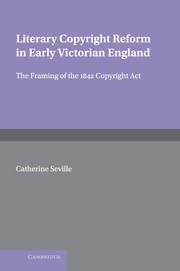Book contents
- Frontmatter
- Contents
- Acknowledgements
- 1 INTRODUCTION
- 2 PETITIONS AND COPYRIGHT
- 3 CRITICS IN PARLIAMENT
- 4 CRITICS IN THE BOOK TRADE I: PRINT WORKERS AND THEIR ALLIES
- 5 CRITICS IN THE BOOK TRADE II: PUBLISHING AND PUBLISHERS
- 6 THE CAMPAIGN IN THE DAILY PRESS
- 7 AUTHORS AND THE BEGINNINGS OF AUTHORS' ORGANISATIONS
- 8 THE MAKING OF THE CASE FOR THE BILL
- 9 CONCLUSION
- Appendix I Chronology of the bills
- Appendix II Successive versions of the bill
- Appendix III The Copyright Act 1842
- Bibliography
- Index
5 - CRITICS IN THE BOOK TRADE II: PUBLISHING AND PUBLISHERS
Published online by Cambridge University Press: 18 July 2009
- Frontmatter
- Contents
- Acknowledgements
- 1 INTRODUCTION
- 2 PETITIONS AND COPYRIGHT
- 3 CRITICS IN PARLIAMENT
- 4 CRITICS IN THE BOOK TRADE I: PRINT WORKERS AND THEIR ALLIES
- 5 CRITICS IN THE BOOK TRADE II: PUBLISHING AND PUBLISHERS
- 6 THE CAMPAIGN IN THE DAILY PRESS
- 7 AUTHORS AND THE BEGINNINGS OF AUTHORS' ORGANISATIONS
- 8 THE MAKING OF THE CASE FOR THE BILL
- 9 CONCLUSION
- Appendix I Chronology of the bills
- Appendix II Successive versions of the bill
- Appendix III The Copyright Act 1842
- Bibliography
- Index
Summary
The book trade's reaction to Talfourd's plans was to mount a well-coordinated and effective campaign of opposition. However, different parts of the trade responded in different ways. As has been demonstrated, workers in the printing trades were accustomed to resist threats posed by technology and other changes in practice: their trade organisations were well suited to this task. Their protests against Talfourd's bills were focused on the presentation of large numbers of petitions, as the only feasible way of making their views heard.
The employers in the world of print had more scope for action. Their modes of protest were therefore noticeably more diffuse: letters, articles, pamphlets and private lobbying were all used, in addition to the few carefully judged petitions: volume was of less importance than influence and profile. Nevertheless, the entrepreneurs in the book trade were also under pressure. The rapid expansion in the reading public had disrupted the market, transforming relationships within the trade. Nor had the transition from bookseller to publisher yet been entirely achieved, adding other tensions to economic anxieties. Another aspect of the changing market was the gradual emergence of the profession of authorship, an issue which was never far from the surface in authors' conceptions of copyright, as will be seen in chapter 7. These pressures gradually transformed the book trade's relationship with authors, and provoked new consideration of the worth of literature and of authorship.
- Type
- Chapter
- Information
- Literary Copyright Reform in Early Victorian EnglandThe Framing of the 1842 Copyright Act, pp. 100 - 127Publisher: Cambridge University PressPrint publication year: 1999



